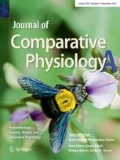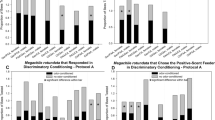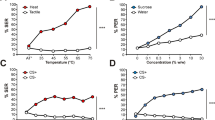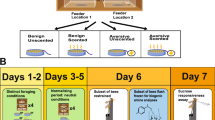Abstract.
When not satiated prior to training, there were no differences between foragers and nurse honey bees in the acquisition of an appetitively based conditioned response in an olfactory associative learning assay, but when satiated foragers showed faster acquisition than did nurses. Satiation-related differences between foragers and nurses were more a function of behavioral state than age, because satiated precocious foragers also showed faster acquisition rates than did satiated nurse bees, despite their similar ages. Tests of sucrose responsiveness and retention of conditioned responses indicate that the observed performance differences between nurses and foragers were more likely due to differential sensitivity of sensory and motor processes related to satiation rather than differences in cognitive ability.
Similar content being viewed by others
Author information
Authors and Affiliations
Additional information
Electronic Publication
Rights and permissions
About this article
Cite this article
Ben-Shahar, Y., Robinson, G.E. Satiation differentially affects performance in a learning assay by nurse and forager honey bees. J Comp Physiol A 187, 891–899 (2001). https://doi.org/10.1007/s00359-001-0260-z
Accepted:
Issue Date:
DOI: https://doi.org/10.1007/s00359-001-0260-z




